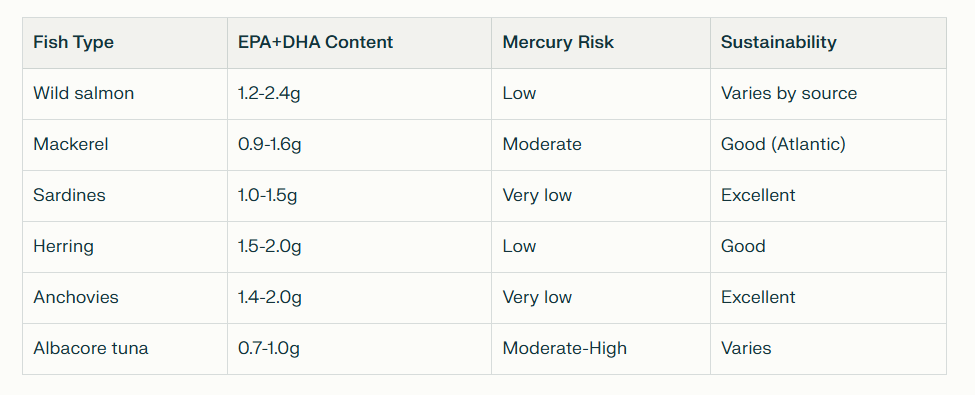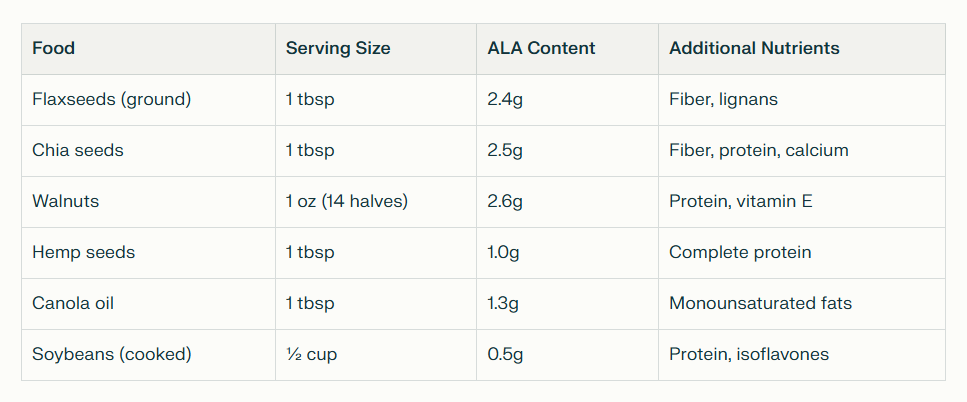Omega-3 Supplements: Heart, Brain & Joint Benefits
Omega-3 supplements support heart, brain, and joint health. Compare fish oil vs plant-based sources, learn dosage tips, and choose quality products for optimal wellness.
UNDERSTAND YOUR SUPPLEMENTS


Introduction: Why Omega-3s Are Essential for Optimal Health
Omega-3 fatty acids represent a class of polyunsaturated fats critical for human health that cannot be synthesized by the body, making dietary intake essential. The American Heart Association recommends eating fatty fish at least twice weekly, yet 80-90% of Americans fail to meet this target, resulting in widespread omega-3 deficiency. Understanding the distinct types of omega-3s—their sources, functions, and optimal intake strategies—empowers informed nutritional decisions for cardiovascular, cognitive, and inflammatory health.
Understanding the Three Types of Omega-3 Fatty Acids
Eicosapentaenoic Acid (EPA): The Anti-Inflammatory Powerhouse
Chemical structure: EPA contains 20 carbon atoms with 5 double bonds (20:5 n-3). This long-chain omega-3 primarily accumulates in cell membranes, where it serves as a precursor for anti-inflammatory eicosanoids—signaling molecules that regulate inflammation, blood clotting, and immune responses.
Key functions of EPA:
Cardiovascular protection: Reduces triglycerides by 15-30% and improves endothelial function
Anti-inflammatory effects: Competes with omega-6 arachidonic acid to produce less inflammatory prostaglandins and leukotrienes
Mental health support: Clinical trials show EPA (1-2g daily) reduces depressive symptoms by 20-30% in major depressive disorder
Platelet aggregation: Mild anticoagulant effects reduce thrombosis risk
Docosahexaenoic Acid (DHA): The Brain and Vision Specialist
Chemical structure: DHA contains 22 carbon atoms with 6 double bonds (22:6 n-3). It represents 40% of polyunsaturated fatty acids in the brain and 60% in the retina, making it indispensable for neurological and visual development.
Critical roles of DHA:
Neurological development: Essential during pregnancy and infancy; maternal DHA status correlates with infant cognitive scores
Cognitive function: Higher DHA levels associate with 25% reduced Alzheimer's risk in elderly populations
Visual acuity: DHA accumulation in photoreceptor membranes supports optimal vision; deficiency impairs retinal function
Neuroprotection: Anti-apoptotic and anti-oxidative properties protect against neurodegenerative disease
Alpha-Linolenic Acid (ALA): The Plant-Based Precursor
Chemical structure: ALA contains 18 carbon atoms with 3 double bonds (18:3 n-3). As the shortest-chain omega-3, ALA must undergo enzymatic conversion to EPA and DHA—a process with inherently low efficiency (5-15% to EPA, <1% to DHA in most individuals).
ALA functions:
Energy source: β-oxidation in mitochondria provides cellular energy
Precursor conversion: Limited transformation to EPA/DHA, influenced by genetics, gender (women convert more efficiently), and dietary omega-6 levels
Independent cardioprotection: Some studies suggest direct cardiovascular benefits beyond EPA/DHA conversion
Anti-inflammatory potential: Modest anti-inflammatory effects through alternative pathways
Conversion efficiency factors:
High omega-6 intake (common in Western diets) competitively inhibits ALA conversion enzymes
Genetic polymorphisms in FADS1 and FADS2 genes affect individual conversion capacity (10-fold variability)
Women of reproductive age show 2-3x higher conversion rates, possibly supporting fetal DHA needs during pregnancy
Evidence-Based Health Benefits of Omega-3 Fatty Acids
Cardiovascular Health: The Most Robust Evidence
Triglyceride reduction:
Meta-analyses of 70+ randomized controlled trials confirm that EPA+DHA supplementation (2-4g daily) reduces triglycerides by 15-30%, with larger reductions in individuals with elevated baseline levels (>200 mg/dL). This effect occurs through enhanced hepatic β-oxidation and reduced VLDL synthesis.
Blood pressure moderation:
Systematic reviews document systolic blood pressure reductions of 2-4 mmHg and diastolic reductions of 1-3 mmHg with omega-3 supplementation (≥3g daily). While modest, these changes translate to significant population-level cardiovascular risk reduction.
Arrhythmia prevention:
Omega-3s stabilize cardiac electrical activity by modulating ion channels. However, recent large trials (VITAL, STRENGTH) show mixed results for arrhythmia prevention, suggesting benefits may be population-specific or require higher doses than previously thought.
Endothelial function:
EPA and DHA improve nitric oxide bioavailability and reduce oxidative stress in vascular endothelium, enhancing vasodilation and reducing atherosclerotic plaque formation. Improvements in flow-mediated dilation (5-10%) appear within 6-12 weeks of supplementation.
Brain Function and Mental Health
Cognitive development:
Maternal DHA intake during pregnancy correlates with infant cognitive development scores, with some studies showing 3-5 point improvements in IQ at age 4 in children of mothers consuming adequate DHA (200-300mg daily during pregnancy).
Alzheimer's disease prevention:
Observational studies link higher dietary omega-3 intake with 25-40% reduced Alzheimer's risk. However, supplementation trials in individuals with established Alzheimer's show limited benefit, suggesting omega-3s work preventatively rather than therapeutically.
Depression treatment:
Meta-analyses confirm EPA-predominant supplements (1-2g daily) significantly reduce depressive symptoms, with effect sizes comparable to some antidepressants in certain populations. DHA-only supplements show weaker effects.
ADHD symptom reduction:
Preliminary evidence suggests EPA+DHA supplementation may modestly improve attention and behavior in children with ADHD, though results remain inconsistent across studies.
Vision and Eye Health
Macular degeneration:
The AREDS2 trial found that 1g EPA+DHA daily reduced progression to advanced age-related macular degeneration by 25% in high-risk individuals. DHA concentration in retinal tissue directly affects photoreceptor function and membrane fluidity.
Dry eye syndrome:
Omega-3 supplementation (1-2g daily) improves tear film quality and reduces dry eye symptoms by decreasing meibomian gland inflammation and enhancing lipid layer stability.
Anti-Inflammatory and Autoimmune Effects
Mechanism of action:
Omega-3s compete with omega-6 arachidonic acid for incorporation into cell membranes and enzymatic processing by cyclooxygenase and lipoxygenase. This shift produces less inflammatory eicosanoids (series-3 prostaglandins and series-5 leukotrienes) and specialized pro-resolving mediators (resolvins, protectins, maresins).
Clinical applications:
Rheumatoid arthritis: 2.6-4g EPA+DHA daily reduces joint tenderness and morning stiffness
Inflammatory bowel disease: Mixed results, with some studies showing symptom improvement
Asthma: Modest reductions in airway inflammation and bronchodilator use
Chronic pain: Preliminary evidence for reduced need for anti-inflammatory medications
Dietary Sources vs. Supplements: A Comparative Analysis
Marine Food Sources (EPA and DHA)
Fatty fish (per 3-oz serving):
Other marine sources:
Oysters, mussels, clams: 0.3-0.5g per serving (lower but bioavailable)
Fish roe (caviar): 1.0-1.8g per serving (expensive but nutrient-dense)
Seaweed and algae: Minimal EPA/DHA (exception: nori contains small amounts)
Advantages of food sources:
Nutrient synergy: Whole fish provide protein, selenium, vitamin D, B vitamins
Bioavailability: Phospholipid-bound omega-3s in fish may have superior absorption
Lower oxidation risk: Fresh fish less prone to rancidity than improperly stored supplements
Disadvantages:
Cost: Quality wild-caught fish expensive ($15-30/lb in US markets)
Contaminant exposure: Mercury, PCBs, dioxins in predatory species
Accessibility: Not everyone has access to fresh fish or enjoys seafood flavor
Preparation requirements: Cooking knowledge and time needed
Plant-Based Sources (ALA)
ALA-rich foods (per serving):
Conversion limitations:
Only 5-15% of ALA converts to EPA and <1% to DHA in most individuals. Vegetarians/vegans relying solely on ALA may have suboptimal EPA/DHA status, potentially requiring direct DHA supplementation (algal oil).
Fish Oil Supplements
Advantages:
Concentrated EPA/DHA: 500-1800mg per capsule
Convenient dosing: Easy to achieve therapeutic doses
Cost-effective: Often cheaper than equivalent fresh fish
Third-party testing: Quality products verified for purity
Disadvantages:
Oxidation risk: Rancid fish oil produces harmful aldehydes and ketones
Digestive side effects: Fishy burps, nausea in some users
Sustainability concerns: Overfishing for fish oil production
Variable quality: Not all brands meet label claims or purity standards
Quality indicators:
Look for IFOS (International Fish Oil Standards) or USP verification
Check peroxide values (<5 meq/kg indicates freshness)
Choose triglyceride or phospholipid forms over ethyl esters for better absorption
Prefer enteric-coated or flavored options to minimize fishy aftertaste
Algal Oil Supplements (Vegan DHA/EPA)
Advantages:
Plant-based/vegan: Suitable for those avoiding animal products
Low contaminant risk: Algae farmed in controlled environments
Sustainable: No impact on marine ecosystems
Direct DHA source: Bypasses inefficient ALA conversion
Disadvantages:
Higher cost: Typically 2-3x more expensive than fish oil
Lower EPA content: Most algal oils primarily provide DHA, with limited EPA
Limited availability: Fewer brand options compared to fish oil
Recommended for:
Pregnant/nursing women (especially vegans)
Individuals with fish allergies
Those concerned about marine sustainability
People seeking minimal contaminant exposure
Krill Oil: A Specialty Option
Unique features:
Phospholipid-bound omega-3s: May enhance absorption and bioavailability
Astaxanthin content: Powerful antioxidant that protects against oxidation
Smaller serving size: Requires less oil for equivalent EPA/DHA
Limitations:
Very expensive: Often 3-5x cost of standard fish oil
Lower omega-3 concentration: Typically 200-400mg EPA+DHA per serving
Sustainability questions: Krill are crucial in marine food webs
Dosage Recommendations: Evidence-Based Guidelines
General health maintenance:
Healthy adults: 250-500mg EPA+DHA daily (equivalent to 2 servings fatty fish/week)
Pregnant/nursing women: 200-300mg DHA daily (critical for fetal brain development)
Children 4-18 years: 100-250mg EPA+DHA daily
Therapeutic dosing:
Elevated triglycerides: 2-4g EPA+DHA daily (prescription-strength available)
Depression: 1-2g EPA daily (ideally EPA-predominant formulas)
Rheumatoid arthritis: 2.6-4g EPA+DHA daily
ADHD: 500-1000mg EPA+DHA daily
Eye health: 500-1000mg EPA+DHA daily
Safety considerations:
Maximum dose: Up to 5g daily generally considered safe by FDA
Bleeding risk: Consult physician if on anticoagulants (warfarin, aspirin)
Surgery: Discontinue high-dose omega-3s 1-2 weeks pre-surgery
Drug interactions: May enhance blood-thinning medications
Quality and Safety: What to Look For
Third-party certifications:
IFOS (5-star rating): Comprehensive purity, potency, and freshness testing
USP Verified: Meets US Pharmacopeia standards
NSF Certified for Sport: Free from banned athletic substances
GOED (Global Organization for EPA and DHA Omega-3s): Industry quality standards
Purity testing:
Heavy metals: Should meet WHO/EPA limits for mercury, lead, cadmium
PCBs and dioxins: <0.09 ppm (parts per million)
Oxidation markers: Peroxide value <5, anisidine value <20, TOTOX <26
Label transparency:
Look for products listing:
Total omega-3 content (not just total oil)
Specific EPA and DHA amounts
Molecular form (triglyceride, ethyl ester, phospholipid)
Expiration date and manufacture date
Storage recommendations
Omega-6 to Omega-3 Ratio: Why Balance Matters
Historical context:
Ancestral human diets maintained omega-6 to omega-3 ratios of 1:1 to 4:1. Modern Western diets average 15:1 to 20:1, primarily from vegetable oils (soybean, corn, sunflower) high in linoleic acid (omega-6).
Health implications:
Excessive omega-6 relative to omega-3 promotes:
Pro-inflammatory eicosanoid production
Increased cardiovascular disease risk
Higher obesity rates
Greater chronic disease burden
Optimization strategies:
Reduce omega-6 intake: Limit processed foods, fried items, and high-omega-6 cooking oils
Increase omega-3 consumption: Prioritize fatty fish, walnuts, flaxseeds, and supplements
Target ratio: Aim for 4:1 or lower through combined dietary approaches
Practical Integration Tips
Storage best practices:
Refrigerate opened bottles: Prevents oxidation and rancidity
Keep away from light/heat: Store in opaque containers in cool places
Check expiration dates: Discard supplements past expiration or with fishy smell/taste
Consider freezing: Fish oil capsules can be frozen to extend shelf life
Timing and absorption:
Take with meals: Fat-soluble omega-3s absorb best with dietary fats
Divide doses: Split larger doses (>2g) across meals for better tolerance
Morning or evening: No significant difference; choose based on routine
Avoid rancid products: Fresh omega-3s have neutral or mild odor
Conclusion: Making Informed Omega-3 Choices
Omega-3 fatty acids—EPA, DHA, and ALA—offer compelling evidence for cardiovascular protection, cognitive support, and anti-inflammatory benefits. Whole food sources like fatty fish provide optimal nutrient synergy, while high-quality supplements offer convenient, concentrated alternatives for those unable to meet needs through diet alone. For Americans seeking to optimize omega-3 status, prioritize:
Dietary foundation: 2+ servings fatty fish weekly (salmon, sardines, mackerel)
Plant-based ALA: Daily servings of walnuts, flaxseeds, or chia seeds
Targeted supplementation: 500-1000mg EPA+DHA for general health, higher for specific conditions
Quality assurance: Choose third-party tested products with verified purity and potency
Balanced omega-6 intake: Reduce processed foods to optimize omega-6:omega-3 ratio
medical disclaimer
This product review is provided for informational purposes only and does not constitute medical advice. Individual results with Plix weight loss products may vary significantly based on diet, exercise, genetics, and overall health status. The FDA does not regulate dietary supplements in the same manner as medications, and claims have not been evaluated by the FDA. Consult with a qualified healthcare provider before starting any weight loss supplement, especially if you have existing health conditions, take medications, or are pregnant or breastfeeding. Apple cider vinegar can interact with certain medications including diabetes drugs, blood thinners, and heart medications. If you experience adverse effects, discontinue use immediately and seek medical attention. Weight loss supplements work best as part of a comprehensive approach including balanced nutrition and regular physical activity.
For evidence-based supplement reviews and personalized weight loss guidance, visit TheDietPlanner.com where we provide comprehensive analysis to support your health and fitness goals safely and effectively.




Connect
Stay updated with our latest diet tips.
Legal
www.thedietplanner.com © 2025. All rights reserved.
